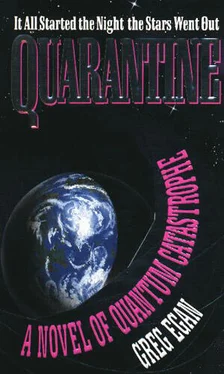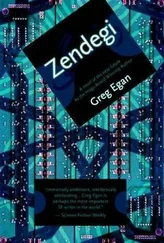'There's no shortage of other explanations for that — I must have heard at least a thousand in the last thirty years.'
'And how many did you think made sense?'
'None, to be honest. But how much sense does this one make? If the Bubble Makers were so vulnerable to our observations, how could they have survived for so long? How far out could telescopes see, before The Bubble? Billions of light years!'
'Yes, but we don't know what kind of damage — what degree of observation — they could tolerate. When the universe was totally uncollapsed, maybe there were forms of life which relied on virtually all of that diversity — forms of life in which each individual was spread out across a large part of the entire span of eigenstates, occupying an enormous range of what we'd consider to be mutually exclusive possibilities. The first collapse, for them, would have been like … taking a thin slice out of a human's body, and throwing all the rest away.'
'So how have the Bubble Makers survived? By being very thin to start with?'
'Exactly! They must require a much narrower range of states. Maybe, for them, the effect was more like… a deep ocean being made shallow. We may have observed galaxies billions of light years away — but we haven't even collapsed the solar system down to the last fragment of meteor dust. Planetary systems of distant stars would still have had a lot of freedom. And maybe an individual Bubble Maker could survive just about anything, short of a face-to-face confrontation with a human being, but increasingly accurate human astronomy was depleting the wave function — "draining the ocean" — to such a degree that constructing The Bubble, to keep us from making things worse, was the only way they could preserve their civilization.'
'I don't know.'
She laughs. 'I don't know, either. And the whole point of The Bubble is that we never will know. I have other theories, though, if you don't like that one. Maybe the Bubble Makers are made of cold dark matter — axions, or some other weakly interacting particle which we've never been able to detect with much efficiency. If that were the case, we might have done them relatively little harm — but they decided that our technology was getting uncomfortably close to the point where it could start to affect them. There were plenty of astronomers searching for cold dark matter in the twenties and the early thirties — and their equipment was becoming a little more sensitive, and a little more accurate, every year. Maybe we have them to blame.'
The abstractions can be put aside. Pressing my way through the streets, the idea that the crowd around me is collectively keeping the city from dissolving into a fog of simultaneous possibilities seems not so much unbelievable, as patently irrelevant. Whatever elaborate, and grotesquely counter-intuitive, underpinnings there might be to familiar reality, it stubbornly continues to be familiar. When Rutherford showed that atoms were mostly empty space, did the ground become any less solid? The truth itself changes nothing.
What I can't put aside is the fact that the Ensemble is doing Bubble science — and it makes no difference whether or not their hypothesis is correct. It's the idea that counts. The layers of security, the bodyguards for the volunteers, have nothing to do with any fear of commercial competition.
The Ensemble has precisely one enemy: the Children of the Abyss.
Boss wakes me smoothly in response to the knock on the door — leaving me clear-headed, but pissed off nonetheless; it's just after midday, and I've only had two hours' sleep. I give the HV an infrared command to display the image from the door's electronic peephole. My visitor is Dr Lui. I dress quickly, baffled. If I was needed back on duty for some reason, surely I would have had a call from Tong or Lee.
I invite him in. He surveys the room with a kind of apologetic bewilderment, as if to say that he'd never imagined that it could have been this humble, but now that he knows, I have his deepest sympathy. I offer him tea; he declines, effusively. We exchange some pleasantries, then there's an awkward silence. He smiles as if in agony, for a long half-minute, then finally says, 'My life is for the Ensemble, Nick.' It sounds half like a passionate affirmation, half like a self-loathing confession.
I nod, and then mumble, 'So is mine.' It's the truth, I shouldn't be ashamed of it — but Lui's own signals are so intense, but confused, that I can't help being infected by his ambiguity.
He says, 'I know what you're going through. The inner battles, the paradoxes, the torment. I know.' I don't doubt him for a moment — and I feel a pang of guilt and unworthiness: his suffering at the cusp of the loyalty mod's contradictions has clearly been a great deal worse than my own.
'And I know you won't thank me for adding to your pain. But the truth never comes easily.'
I nod idiotically at this platitude, while a detached part of me wonders: is this the next stage? A kind of masochistic wallowing in the conflict that the loyalty mod creates? Forcing myself to dwell upon my reason's impotence — and romanticizing my distress into some kind of mystical, revelatory suffering? It makes a certain perverse sense: I don't want to resent the mod — so why shouldn't I try to view my mental turmoil in a different light, redefine its meaning, declare that it's leading me towards deeper insight and stronger faith?
Lui continues, 'We both want to serve the Ensemble — but what does that actually mean? Day by day we do our jobs, obey our instructions, play our part — hoping that those above us in the chain of command can be trusted to have the Ensemble's best interests at heart. But the question you must ask yourself is: do they deserve that trust? Are they serving the Ensemble with the kind of absolute dedication that to you or me would be second nature… or are they merely serving their own interests? How can we be sure?'
I shake my head. 'They're part of the Ensemble. Our loyalty is to them — '
'Part of the Ensemble, yes. Our loyalty is to the whole.'
I don't know quite how to respond to that. It's certainly true — in the sense that the mod refers only to the Ensemble, and not to any specific person. But why bother making the distinction? What practical difference does it make?
I shift in my chair, self-consciously; Lui leans towards me, his earnest young face glowing with a kind of intellectual urgency. Our loyalty is to the whole. I'm beginning to wonder if he's constructed an entire system of moral philosophy around the effects of the loyalty mod — a prospect which makes me distinctly uneasy. It would hardly be the first time in history that a victim of mental illness has responded to their affliction that way — but it would certainly be the first time that I've found myself in the vulnerable position of sharing the brain-damaged prophet's impairment, down to the last neuron.
I say, reasonably, 'We all have to get orders from somewhere. We have to assume that the chain of command works. In practice, what alternative is there? I don't even know what the upper-level management structure of ASR is — let alone the Ensemble. And even if I did, what are you suggesting? That I should only take instructions from the very top? That would be absurd. Everything would grind to a halt.'
Lui shakes his head. 'I'm not saying that at all. Take your instructions from the top? There's more than one "top". Wei Pai-lingowns BDI, yes-' I frown and begin to disclaim any knowledge of the man, or the acronym, but Lui says impatiently, 'I know precisely how you joined us; there's no point wasting your breath. Wei owns BDI — but what makes you think he's in control of everything else? He has some limited influence over the other participants in NHK — but very little clout elsewhere. Did you think BDI found Laura Andrews?'
Читать дальше










